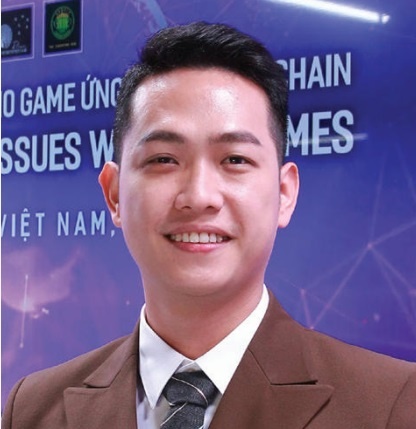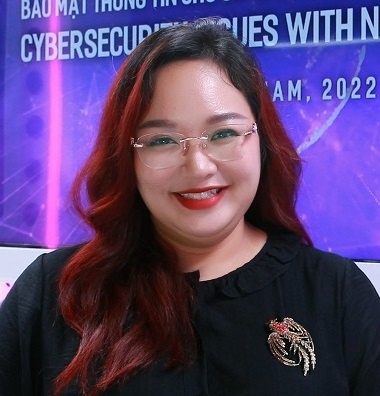Lack of blockchain training obstructing real progress
 |
| Lack of blockchain training obstructing real progress, photo: freepik.com |
From a country falling behind in technology, thanks to blockchain Vietnam has become a leader by ranking in the top 10 of GameFi projects, and with the highest revenues in the Binance ecosystem at the Binance Blockchain week in Dubai.
According to Chainalysis, Vietnam has the highest blockchain application adoption index in the world, five times more than users in the US. With the global blockchain market value exceeding $3 trillion last year, opportunities for Vietnamese tech businesses are huge. But the possibility of a new unicorn appearing is not easy because building human resources to operate and deploy the blockchain platform is still a difficult problem for most businesses.
Nguyen Ngoc Dung, president of Vietnam E-Commerce Association admitted, “Many businesses contact us and express their desire to apply blockchain to business and production and ask where to start. The deciding factor here is the technology staff. The shortage of training facilities is always a big concern.”
Nguyen The Vinh, Coin98 co-founder also lamented that the novelty of the blockchain industry has exacerbated the shortage of personnel. While the number of projects is increasing, it is not easy to convince talents from other fields to work in the industry, despite offering attractive policies in terms of income.
Sharing knowledge
Today, not many in Vietnam have deeply studied and developed formal training programmes, and most of the personnel working in the industry were previously self-taught and later participated in short-term training courses organised by some centres.
On the other hand, the number of related projects is booming right now. The advantage of abundant and cheap labour also makes Vietnam an attractive destination for blockchain technology enterprises, causing brain drain and prolonged shortage of personnel. To remove this bottleneck, many enterprises are self-organising recruitment and training in order to be more proactive.
Nguyen Huu An, co-founder and CTO of Sotatek JSC, said that his company had to build internal training programmes or cooperate with training centres to organise short-term training courses of 10-20 sessions to provide basic knowledge about blockchain for new inexperienced employees.
“We also encourage employees to participate in training courses and earn professional certifications for their jobs. All costs will be covered by the company. Blockchain technology develops very quickly, so learners must regularly update new information if they do not want to become out of date,” An said. He added that in the long run, more sustainable measures will be needed such as policy changes, and making blockchain a specialised subject in universities and colleges.
Currently, a number of blockchain startups such as D.lion, Coin98, and Sentre are also prioritising many resources in training high-quality engineers.
Despite being a new face in the industry, D.lion already has a plan to set up a training academy for blockchain engineers to serve the development of the group’s projects, as well as provide more human resources for other businesses.
Large technology companies also participate in this potential field with ample room for development. FPT Software has about 20,000 software engineers, of which the blockchain team accounts for a large proportion. In 2019, FPT also launched the FUNiX training programme, which provides courses on blockchain finance development for seven months with a commitment of $600 or more in income for engineers.
Techacademy, one of the leading programming training centres in Vietnam with 15 years of experience, also introduced blockchain basic training courses within four months, attracting thousands of students every year.
In the formal education system, Hanoi University of Science and Technology along with the Institute of ICT has organised training courses for undergraduate and master’s levels. Hanoi National University also has a fintech training programme with blockchain as a required subject. In addition, labs at some universities such as the Institute of Posts and Telecommunications also help students initially get acquainted with this tech.
Sufficiently equipped
However, many experts evaluate that blockchain is not easy to learn and training effectiveness still needs more time to be evaluated.
Cai Dang Son, director of Products and Engineering at Navigos Group, recommends that instead of following trends, technology personnel need to have a clear orientation, actively research more documents from abroad, and participate in workshops to have the opportunity to talk with experts in the industry.
“There are a lot of people working on projects related to crypto exchanges, but blockchain is still applied in many other fields such as logistics, finance, healthcare, even music. Personnel should be equipped with more complete knowledge about blockchain because this technology can change many areas,” Son said.
Some Vietnamese companies are now expanding to markets such as the UAE, India, South Korea, and even Europe in search of a quality programming team.
According to Nguyen Thi Ngoc Dung from the National Innovation Centre, Vietnam needs to strengthen training through international cooperation programmes.
“The government needs to create conditions to form a complete ecosystem to support activities,” concluded Dung. “With the IT level and acumen of young people, the expectation that Vietnam becomes the blockchain centre of the region is not too unrealistic.”
| Trinh Ngoc Duc - CEO, Fight of the Ages
Many people mistakenly believe that the most challenging things about a project are the product, marketing campaign, finance, etc. The most difficult thing for every startup is finding a team. Foreign investment funds, before considering pouring capital into a project, will spend a lot of time learning about the quality of their staff, their level of solidarity and working style. For me, in addition to choosing a core team as the key factor determining the success or failure of a blockchain project, there are two other very important factors. The role of incubator supports and advises the project on marketing plans, finances, tokenomics, ideas, and project sponsorship; while the lead fund role is the person who supports all issues related to partnerships, calling for capital and allocating funds for your project. They will be two companions with the project from the time the idea is on paper until the end of the development journey so absolute care must be taken when choosing these important partners. Another factor that makes me very proud when introducing Fight of the Ages (FOTA) is that it is a Vietnamese product with 100 per cent Vietnamese employees. Fortunately, during the development period, our potential is to attract more quality human resources from abroad who have long experience in their field of expertise and are extremely passionate about the profession. Every single FOTA employee is devoting all their talents and energies to bringing us to the next level in the GameFi and blockchain gaming industry. Jennie Hoang Phuong - CEO, D.lion Media & Solutions
Although there are abundant human resources, Vietnam does not have many blockchain experts and most of the human resources come from other industries. This leads to a lack of foundation along with a lack of patience that will create negative consequences affecting the development of the project. We prioritise choosing people who are good at doing the right things. Each aspect of D.lion’s activities has good people to advise and ensure its own development. We have excellent human resources from Microsoft in the field of augmented and mixed reality, HOBBIT for investment management, Djinn Guild Game for expansion and management of the gamer market, and more besides. It is these groups or individuals with outstanding ability that will help D.lion’s projects develop faster and more efficiently. We focus on fostering and developing personnel, thereby building a strong corporate culture. D.lion is ready to recruit employees who are passionate about the profession and accept re-training or new training completely free of charge. We prepare accommodation for free and create an environment where you can study and work. In the future, we plan to continue to perfect the ecosystem by adding a blockchain training academy called NextGen Academy. This will be a gathering place for young people with knowledge and well-trained expertise in blockchain. This direction has not been focused on by many Vietnamese businesses because of the high investment costs, but we are ready to be one of the pioneers with the desire to create a quality human resource market in blockchain in Vietnam. |
What the stars mean:
★ Poor ★ ★ Promising ★★★ Good ★★★★ Very good ★★★★★ Exceptional
Themes: Digital Transformation
- Dassault Systèmes and Nvidia to build platform powering virtual twins
- Sci-tech sector sees January revenue growth of 23 per cent
- Advanced semiconductor testing and packaging plant to become operational in 2027
- BIM and ISO 19650 seen as key to improving project efficiency
- Viettel starts construction of semiconductor chip production plant
Related Contents
Latest News
More News
- Vietnam embracing a brand new reality in gaming industry (July 18, 2022 | 08:00)
- Alliance powering up game developers (July 11, 2022 | 10:00)
- Opening up capital flows for local blockchain startups (July 11, 2022 | 09:00)
- Reaching a new stage of blockchain game funding (July 07, 2022 | 18:00)
- Building innovative funds in blockchain biz (July 07, 2022 | 09:00)
- Vietnam to welcome global blockchain extravaganza (July 06, 2022 | 14:55)
- A rising star in Vietnam’s gaming sector (June 20, 2022 | 14:00)
- Funds keep an eye on blockchain projects for investment opportunities (June 01, 2022 | 22:35)
- Foundations set for blockchain (May 30, 2022 | 09:58)
- Bolstering cybersecurity along with the rise of NFT games (May 25, 2022 | 12:54)



 Tag:
Tag:




















 Mobile Version
Mobile Version